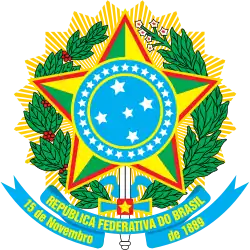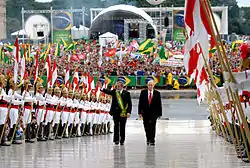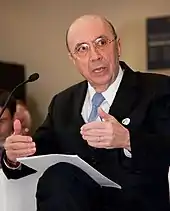First presidency of Lula da Silva
The First presidency of Lula da Silva corresponds to the period in Brazilian political history that began with the inauguration of Luiz Inácio Lula da Silva as President on January 1, 2003, in his fourth candidacy for this office and after defeating the PSDB candidate, José Serra, with 61.27% of the valid votes in a second round.[2] Lula was the first former worker to become president of Brazil, and he governed the country for two consecutive terms (2003 until 2007 , and from 2007 until 2011).[3] In October 2006, Lula was reelected to the presidency, defeating the PSDB candidate Geraldo Alckmin in the second round, obtaining more than 60% of the valid votes against 39.17% for his opponent.[4] His term in office ended on January 1, 2011. Lula's government ended with record approval from the population, with more than 80% positive ratings.[5][6][7]
.jpg.webp) | |
| First presidency of Lula da Silva 1 January 2003 – 1 January 2011[1] | |
Luiz Inácio Lula da Silva | |
| Cabinet | See list |
| Party | Workers' |
| Election | |
| Seat | Palácio do Planalto |
 | |
| Official website | |
| ||
|---|---|---|
|
35th President of Brazil
39th President of Brazil
Scandals and controversies
Presidential elections
|
||
Its main hallmarks were the maintenance of economic stability, the resumption of the country's growth, and the reduction of poverty and social inequality.[8] His first presidency registered the highest average GDP growth in two decades, around 4.1%, and total growth was 32.62%. Per capita income grew 23.05%, with an average of 2.8%.[9] The growth was driven by the rise in commodity prices, domestic demand, helped by programs like Bolsa Família and the reduction in international interest rates.[10][11][12] Despite economic growth, productivity has not increased along with it.[13] Lula took office with inflation at 12.53% and delivered at 5.90%.[14]
One of Lula's campaign platforms was the need for constitutional reforms.[15] A relevant reform that took place during Lula's government was the approval of Constitutional Amendment 45, in 2004, which became known as the "Judiciary Reform".[16]
His first presidency was also notable for the country's quest to host major sporting events. The 2007 Pan-American Games took place during his mandate. So did the choice of Brazil to host the 2014 FIFA World Cup and the 2016 Olympic Games. The decisions generated controversy about the losses[17][18][19] and legacies of each event.[20][21][22]
In 2009, the penultimate year of the Lula administration, an annual study conducted by the NGO Transparency International reported that Brazil ranked 75th in a ranking of 180 countries on perceived corruption. The study gave Brazil a score of 3.7, which indicates corruption problems, according to the entity.[23] Brazil got worse in the ranking between 2002 (score 4.0, 45th in the ranking) and 2009 (score 3.7, 75th in the ranking), having dropped 30 places.[24] In 2008, the Democracy Index, elaborated annually by the British magazine The Economist, ranked Brazil as the 41st most democratic country in the world.[25]
Letter to the Brazilian people
Still during the election campaign, Lula wrote the "Letter to the Brazilian people" where he assured that in case of his victory his party, the Workers', would respect national and international contracts. The letter was read on June 22, 2002 during a meeting about the party's government program.[26]
Inaugurations

Luiz Inácio Lula da Silva took office on January 1, 2003, having been elected president in 2002. He was the second Brazilian president to take office on this date, the third president elected since the end of the military dictatorship, and the first socialist-oriented former worker to assume the Presidency of Brazil.[27][28]
The inauguration for Luiz Inácio Lula da Silva's second term as president of the Federative Republic of Brazil took place on January 1, 2007. He was sworn in again with the vice-president, José Alencar. The ceremony began shortly after 4pm in the plenary of the National Congress in Brasilia and was presided over by then Senate President Renan Calheiros. As in the inauguration of the first mandate, the reelected president and vice-president read and signed the term of office, and then the national anthem was played by the Marine Band.[29]
Internal policy
Economy

Lula was elected in a difficult economic context,[12] and his administration began by following the economic policy of the previous government, FHC.[30] To this end, he nominated Henrique Meirelles, a federal deputy elected by the PSDB of Goiás in 2002, to head the Brazilian Central Bank, sending a strong signal to the market - especially the international market, where Meirelles is well known for having been the president of Bank Boston - that there would be no abrupt changes in the conduct of economic policy in his government.[31] He appointed Antônio Palocci, a sanitarian physician and former mayor of Ribeirão Preto, a member of the Workers' Party, as Minister of Finance. After repeated accusations against Palocci by the media, in the case known as "Scandal of the breach of the bank secrecy of Francenildo, the bank teller", Palocci resigned (on August 27, 2009, the STF dismissed the accusation against Palocci).[32] His replacement was the economist and university professor Guido Mantega, who took over the ministry on March 27, 2006.
The Lula administration was characterized by low inflation, which was under control,[33] reduction in unemployment and constant records in the balance of trade.[34] During President Lula's administration there was a record production in the automobile industry in 2005, the largest real growth in the minimum wage[35] and reduction of the Gini coefficient.[36]
In 2010, Alan Mulally, Ford's global president, stated that thanks to the incentive programs of Lula's government, it was possible for the country to effectively come out of the world crisis.[37] During the crisis the GDP retraction was only 0.2%, showing a better result than the major economies of the world.[33]
The economic growth was driven by the commodities boom, the reduction in international interest rates, and the increase in domestic consumption, supported by the increase in the minimum wage and income transfer programs such as Bolsa Família.[10][12][11]
See also
References
- "Luiz Inácio Lula da Silva (Resumo do Governo)". Retrieved 2023-10-08.
- "Raio-X das eleições". UOL Eleições 2010 (in Brazilian Portuguese). Archived from the original on 2011-05-27. Retrieved 2011-06-05.
- "Após três eleições, Lula chega à Presidência da República". Folha poder (in Brazilian Portuguese). 2002-10-27. Archived from the original on 2012-10-22. Retrieved 2011-06-05.
- "Com 100% das urnas apuradas, Lula é reeleito com 60,83%". Terra notícias (in Brazilian Portuguese). 2006-10-30. Archived from the original on 2012-01-17. Retrieved 2011-06-05.
- "Lula encerra governo com aprovação recorde, mostra CNI-Ibope". Correio Braziliense (in Brazilian Portuguese). 2010-12-16. Archived from the original on 2018-07-26. Retrieved 2011-06-05.
- "Aprovação de Lula chega a 83%, diz Datafolha". R7 Brasil (in Brazilian Portuguese). 2010-12-19. Archived from the original on 2010-12-22. Retrieved 2011-06-05.
- "Lula encerra governo com aprovação recorde de 87% da população". R7 Brasil (in Brazilian Portuguese). 2010-12-29. Archived from the original on 2011-01-10. Retrieved 2011-06-05.
- "O país que ele construiu". IstoÉ Dinheiro. 2010-12-29. Archived from the original on 2021-12-22. Retrieved 2021-12-22.
- "GDP growth (annual %) | Data". data.worldbank.org. Archived from the original on 2017-06-24. Retrieved 2017-06-16.
- Barbosa 2020, p. 155.
- Araujo, Victor Leonardo de (2019). "O primeiro governo Lula (2003-2006): retomada do crescimento e bonança internacional" (PDF). Anais do XXIV Encontro Nacional de Economia Política (in Brazilian Portuguese). Archived (PDF) from the original on 2021-10-24. Retrieved 2021-10-23.
- Biancarelli 2014, p. 275.
- Giselle Garcia (2016-05-15). "Entenda a crise econômica". Agência Brasil (in Brazilian Portuguese). Archived from the original on 2021-10-10. Retrieved 2018-02-06.
- "Inflação e Dívida Pública". R7 (in Brazilian Portuguese). Archived from the original on 2018-03-07. Retrieved 2018-02-26.
- Karenine Miracelly Rocha da Cunha. "Agora é Lula: Enquadramentos do Governo do PT pelo Jornal Nacional" (PDF). Universidade Estadual Paulista (in Brazilian Portuguese). Archived (PDF) from the original on 2023-07-29. Retrieved 2022-11-03.
- Andre Domingues Figaro (2005). Comentários à Reforma do Judiciário: Emenda Constitucional 45 (in Brazilian Portuguese). Premier Máxima. ISBN 8598290238.
- "Lula admite que Pan 07 custará "muito" ao país". Folha de S.Paulo (in Brazilian Portuguese). Archived from the original on 2018-02-27. Retrieved 2018-02-26.
- "Um ano depois da Copa, oito dos 12 estádios têm prejuízo". Folha de S.Paulo (in Brazilian Portuguese). Archived from the original on 2018-02-27. Retrieved 2018-02-26.
- "Organizar Olimpíada dá prejuízo, menos para o COI". Folha de S.Paulo (in Brazilian Portuguese). Archived from the original on 2018-02-27. Retrieved 2018-02-26.
- "Gasto público com o Pan aumenta 684% em 5 anos". Folha de S.Paulo (in Brazilian Portuguese). Archived from the original on 2018-02-27. Retrieved 2018-02-26.
- "Arenas da Copa do Mundo se revelam 'elefantes brancos'". Folha de S.Paulo (in Brazilian Portuguese). Archived from the original on 2018-02-27. Retrieved 2018-02-26.
- "Um ano depois, Olimpíada do Rio continua polêmica". Folha de S.Paulo (in Brazilian Portuguese). Archived from the original on 2018-02-27. Retrieved 2018-02-26.
- "Brasil ocupa 75º lugar em ranking de corrupção, diz ONG". Estadão Política (in Brazilian Portuguese). 2009-11-17. Archived from the original on 2012-01-11. Retrieved 2011-07-16.
- "Brasil fica em 72º em ranking mundial de corrupção, diz ONG". G1 corrupção (in Brazilian Portuguese). 2007-06-26. Archived from the original on 2009-03-01. Retrieved 2011-07-16.
- "Brasil é "democracia falha"". Gazeta do Povo (in Brazilian Portuguese). 2009-05-03. Archived from the original on 2014-11-06. Retrieved 2011-07-16.
- "Leia íntegra da carta de Lula para acalmar o mercado financeiro". Folha de S.Paulo (in Brazilian Portuguese). 2002-06-24. Archived from the original on 2014-07-05. Retrieved 2019-06-09.
- "Lula toma posse em cerimônia com 'jeito de povo'". BBC Brasil (in Brazilian Portuguese). 2003-01-01. Archived from the original on 2016-02-08. Retrieved 2016-01-19.
- "Lula assume o país diante de 200 mil pessoas. Posse foi marcada por festa popular". Revista Época (in Brazilian Portuguese). 2003-01-01. Archived from the original on 2016-10-02. Retrieved 2016-01-19.
- "Cerimônia da posse de Lula começa com desfile em carro aberto". Alagoas 24 Horas (in Brazilian Portuguese). 2007-01-01. Archived from the original on 2016-03-03. Retrieved 2015-07-26.
- Flávio Vilela Vieira; Michele Polline Veríssimo. "Crescimento econômico em economias emergentes selecionadas: Brasil, Rússia, Índia, China (BRIC) e África do Sul" (PDF). Universidade Federal de Uberlândia (in Brazilian Portuguese). Archived from the original (PDF) on 2016-03-03. Retrieved 2011-07-21.
{{cite web}}: CS1 maint: multiple names: authors list (link) - "Lula mantém Meirelles no BC e evita terrorismo de Serra". Conversa Afiada (in Brazilian Portuguese). 2010-04-01. Retrieved 2011-06-05.
- "Por cinco votos a quatro, STF arquiva denúncia contra deputado Antonio Palocci". Supremo Tribunal Federal (in Brazilian Portuguese). 2009-08-27. Archived from the original on 2010-01-08. Retrieved 2011-06-05.
- "Por que as eleições no Brasil importam no cenário internacional". O Globo País (in Brazilian Portuguese). 2010-09-28. Archived from the original on 2023-07-29. Retrieved 2011-06-05.
- "Apesar da crise". Litoral Virtual (in Brazilian Portuguese). 2005-08-22. Archived from the original on 2008-06-19. Retrieved 2011-06-05.
- "SALÁRIO MÍNIMO" (PDF). Ministério do Trabalho e Emprego (in Brazilian Portuguese). 2006-01-24. Archived (PDF) from the original on 2010-12-14. Retrieved 2011-06-05.
- Biancarelli 2014, p. 276.
- "Ford planeja novo automóvel popular para crescer no Brasil". Brasil Econômico (in Brazilian Portuguese). 2010-08-24. Archived from the original on 2010-08-28. Retrieved 2011-06-05.
Bibliography
- Barbosa, Igor Palma (2020). "A alta das commodities agrícolas e o estabelecimento do milagrinho na economia brasileira do governo Lula". Revista Conjuntura Global (in Brazilian Portuguese). 9 (2): 155. doi:10.5380/cg.v9i2.75712. S2CID 234522921.
- Biancarelli, André M. (2014). "A Era Lula e sua questão econômica principal: crescimento, mercado interno e distribuição de renda". Revista do Instituto de Estudos Brasileiros (in Brazilian Portuguese) (58): 263. doi:10.11606/issn.2316-901X.v0i58p263-288.
.jpg.webp)